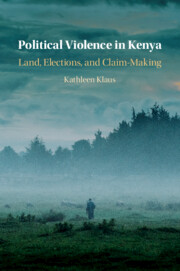Crossref Citations
This Book has been
cited by the following publications. This list is generated based on data provided by Crossref.
Harris, Colin
Cai, Meina
Murtazashvili, Ilia
and
Murtazashvili, Jennifer
2020.
The Origins and Consequences of Property Rights.
2020.
Regime Threats and State Solutions.
p.
86.
2020.
Regime Threats and State Solutions.
p.
212.
Malik, Aditi
and
Onguny, Philip
2020.
Elite strategies, emphasis frames, and mass perspectives on electoral violence in Kenya.
Journal of Contemporary African Studies,
Vol. 38,
Issue. 4,
p.
560.
2020.
Regime Threats and State Solutions.
p.
176.
2020.
Regime Threats and State Solutions.
p.
1.
2020.
Regime Threats and State Solutions.
p.
28.
2020.
Regime Threats and State Solutions.
p.
57.
2020.
Regime Threats and State Solutions.
p.
149.
2020.
Regime Threats and State Solutions.
p.
243.
2020.
Regime Threats and State Solutions.
p.
116.
2020.
Regime Threats and State Solutions.
p.
xv.
Hassan, Mai
2020.
Regime Threats and State Solutions.
2020.
Regime Threats and State Solutions.
p.
257.
2020.
Regime Threats and State Solutions.
p.
277.
Devasher, Madhavi
and
Gadjanova, Elena
2021.
Cross‐ethnic appeals in plural democracies.
Nations and Nationalism,
Vol. 27,
Issue. 3,
p.
673.
Rosenzweig, Steven C.
2021.
Dangerous Disconnect: Voter Backlash, Elite Misperception, and the Costs of Violence as an Electoral Tactic.
Political Behavior,
Vol. 43,
Issue. 4,
p.
1731.
PENGL, YANNICK I.
ROESSLER, PHILIP
and
RUEDA, VALERIA
2022.
Cash Crops, Print Technologies, and the Politicization of Ethnicity in Africa.
American Political Science Review,
Vol. 116,
Issue. 1,
p.
181.
Barriga, Alicia
Ferguson, Neil T. N.
Fiala, Nathan
and
Leroch, Martin Alois
2023.
Ethnic cooperation and conflict in Kenya.
Journal of Behavioral and Experimental Economics,
Vol. 106,
Issue. ,
p.
102050.
FERREE, KAREN E.
HONIG, LAUREN
LUST, ELLEN
and
PHILLIPS, MELANIE L.
2023.
Land and Legibility: When Do Citizens Expect Secure Property Rights in Weak States?.
American Political Science Review,
Vol. 117,
Issue. 1,
p.
42.



